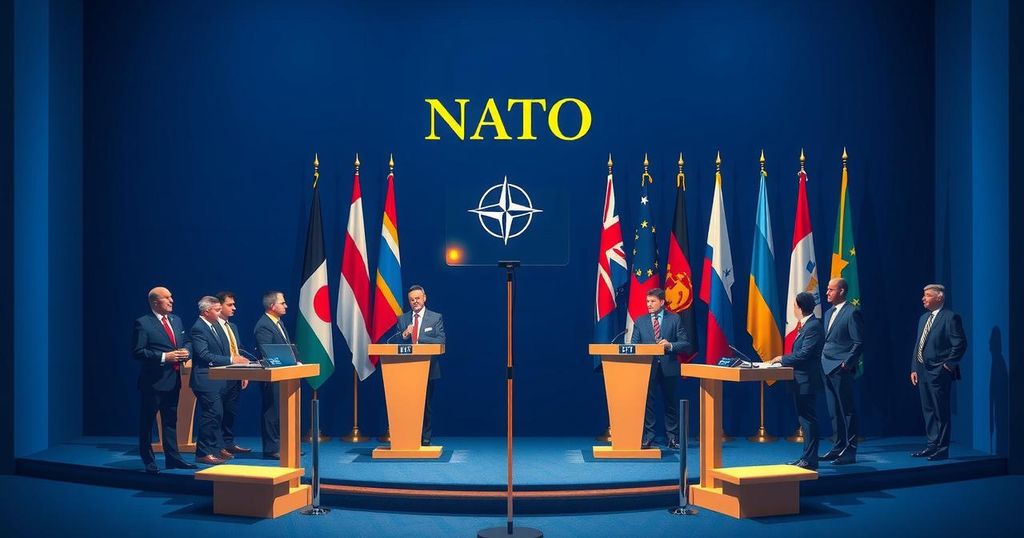World news
” TRUMP, ALEX BRANDON, AP, ASIA, BRENDAN SMIALOWSKI, DEFENSE, DICK SCHOOF, DONALD TRUMP, EUROPE, HAGUE, IRAN, MARCO RUBIO, MARK RUTTE, MEDIA, MEDIA CRITICISM, MINISTRY, NATIONAL SECURITY, NATO, NETHERLANDS, NORTH AMERICA, PETE HEGSETH, POLITICS, TEHRAN, THE HAGUE, TRUMP, TRUMP ADMINISTRATION, U. S, UNITED STATES, WHITE HOUSE
David O'Sullivan
0 Comments
Trump Grapples for Upper Hand in Debate Over Damage Caused by US Strikes on Iran
President Trump is in a heated debate regarding the effectiveness of U.S. strikes on Iran’s nuclear program. He insists the damage was significant while rejecting initial intelligence assessments that suggest minimal impact. The situation is complicated by potential diplomatic talks and Trump’s ongoing tensions with the media and intelligence community over leaks. As Trump prepares to assert his narrative, significant challenges lie ahead in dealing with Iran’s nuclear ambitions.
U.S. President Donald Trump is currently embroiled in a debate concerning the damage inflicted by U.S. airstrikes on Iran’s nuclear program. His administration is saying Republican representatives will meet next week, which might spark some cautious optimism for a lasting peace, despite Tehran’s firm stance on retaining its nuclear aspirations. The ongoing tensions were front and center during Trump’s recent presence at a NATO summit in the Hague, Netherlands.
During the summit, Trump strongly contested an early intelligence assessment that claimed the airstrikes had only a minimal impact on Iran’s nuclear operations. The president argued that American intelligence sources did not fully grasp the situation, asserting his belief that the strikes had delivered a significant blow to Iranian facilities. Trump claimed, “This was a devastating attack, and it knocked them for a loop,” echoing comments he made shortly after the strikes.
Defense Secretary Pete Hegseth and military officials are slated to hold a news conference Thursday, according to Trump, to defend the actions of U.S. pilots during the mission. The president mentioned that these military members were upset over media reports downplaying the strikes’ effectiveness. This rhetoric echoes Trump’s longstanding issues with intelligence leaks and media criticism, labeling those outlets as “scum” and “disgusting.”
Amidst all this, Secretary of State Marco Rubio also weighed in, saying Iran was “much further away from a nuclear weapon today” than before the operations commenced. This commentary, however, may not reflect the aggressive assertions made by Trump. Assessing the true effects of the airstrikes continues to be quite challenging, particularly in the early aftermath, which invites competing narratives that could significantly sway voter opinion ahead of upcoming elections.
Meanwhile, experts like Jeffrey Lewis from the Middlebury Institute pointed out the contradictions in Trump’s statements, arguing that it is still too early to know the extent of the damage. “If it’s too early to know, why is Trump saying it’s obliterated?” Lewis questioned. He emphasized the complexities that lie ahead, particularly regarding any diplomatic efforts necessary to prevent Iran from potentially rebuilding its nuclear program.
As efforts to engage in dialogue between U.S. and Iranian officials resurface, Trump expressed that he is not overly concerned about reaching a formal agreement. He confidently stated, “I don’t care if I have an agreement or not,” suggesting that the alleged destruction of Iranian capabilities offers a sort of assurance of reduced threat. Despite these assurances from Trump, Iran maintains that its nuclear objectives are purely peaceful in nature.
Moreover, the Defense Intelligence Agency, which contributed to the initial intelligence assessment, is generally known for rapid preliminary results that still rely on available information. Noteworthy figures such as former Defense Secretary Leon Panetta said a complete understanding of the strikes’ effectiveness may take weeks, underscoring the uncertainty that surrounds military assessments.
Citing evidence from satellite images and other reports, Trump maintained that the strikes would effectively debilitate Iran’s enrichment facilities. “They’re not going to be doing it anyway. They’ve had it,” Trump declared. Israeli officials echoed these sentiments, claiming significant setbacks to Iran’s nuclear progress, though skepticism surrounding whether all essential materials were protected before the strikes remains a critical point of contention.
In light of the media scrutiny, the White House is also reportedly considering restricting the sharing of classified documents with Congress, a move that is likely to provoke opposition among lawmakers. The implications of this tactic, alongside other political gymnastics, will be scrutinized further as classified briefings are expected to occur Thursday and Friday, following delays caused by the media fallout surrounding Trump’s comments.
In summary, President Trump’s claims about the strikes’ impact on Iran’s nuclear program continue to stir debate. His assertions that U.S. airstrikes delivered a debilitating blow contrast sharply with initial intelligence assessments, creating a whirlwind of contrasting narratives. As diplomatic discussions loom on the horizon, the administration finds itself navigating complex foreign policy waters, with opposition and scrutiny from various quarters. As the situation develops, clarity about the strikes’ effectiveness and the future of U.S.-Iran relations will be crucial for both national and international stakeholders.
Original Source: apnews.com




Post Comment